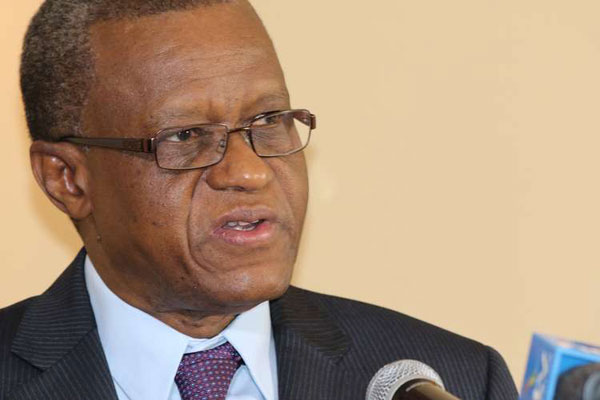If I didn’t believe Somalia will rise up again, I’d have quit my job, Maman Sidikou

The African Union’s Special Representative for Somalia, Maman Sidikou has one of the toughest jobs on earth — to bring peace and stability to country that has been rocked by war for more than two decades. He told Jeff Otieno about his ‘Mission Possible’
Human Rights Watch, in its 2014 report, accused Somali government forces and African Union troops, along with Al Shabaab, of gross human rights violation. Could you comment on this allegation?
I can only talk about Amisom, being the head of the team. Despite the fact that Human Rights Watch compiled the report without consulting us, the African Union Commission Chairperson Nkosazana Dlamini-Zuma appointed a team to investigate the allegations and two cases of sexual abuse were found. We published the outcome of the independent panel and the matter is now being pursued.
In addition, we now have a Civilian Casualty Tracking Cell that investigates civilian casualties. This is important because when civilians are killed, even by Al Shabaab, it is sometimes wrongly blamed on Amisom soldiers.
Although African Union forces have managed to drive Al Shabaab out of many areas, targeted killings by the extremist group are still common. What more can AU and the Somalia government do to reduce these killings?
AU countries need to share intelligence and make sure the Amisom headquarters is the one in charge of command, control and coordination.
No army goes to war without ensuring the three Cs are in place. Al Shabaab is running scared and going after soft targets to portray Somalia as ungovernable. The onus is on us to help Somalia strengthen its security structures to help deal with this threat.
One of the Somali MPs recently said that the AU and the Somali government should consider negotiating with Al Shabaab to bring peace and security to the troubled nation. Would the AU consider such an option?
Any war ends with some type of discussion. But in this case whom can we negotiate with? Al Shabaab, fighters are terrorists and it is not possible to negotiate with such people.
The most important group we should try to win over are the youth, who have been misled to join Al Shabaab. In fact, we should go beyond the talk and provide them with opportunities like education, vocational training and jobs.
Some diplomats have said the international community needs to properly equip Amisom and the Somalia government if Al Shabaab is to be defeated. Is Amisom so far satisfied with international community’s response?
Amisom needs support. Some 12 helicopters that were supposed to be donated to us in 2013 are yet to arrive. Once they arrive, we will require funds to keep them in good shape.
Second, given the poor condition of the roads in Somalia, our vehicles need regular maintenance. We also need instruments to detect IEDs (improvised explosive devices) and intelligence from our partners.
We are also establishing a quick response special force. All these require money.
The European Union, which has been supporting us, is cutting its funding by 20 per cent, beginning next year. The AU, the countries contributing forces and other partners have to bridge the shortfall. We have 22,000 troops and we cannot reduce the number, given the task at hand. In fact, the United Nations Security Council has approved an increase in their number.
Some countries have re-established ties with Somalia and even opened embassies despite the security concerns. How important is such a move in stabilising Somalia?
This is a strong message we are sending to the Somali people — that we support them. Of course there are risks, but we need to be there like Kenya, Uganda, Burundi, China, Qatar, Djibouti, Turkey, European Union and the Arab League States.
Kenya is one of the countries bearing the brunt of the war in Somalia through cross-border terrorist attacks. This has prompted some politicians to call for the withdrawal of Kenyan soldiers from Somalia. Is this justified?
It is naïve at the most to think that Al Shabaab would leave Kenya alone if the troops came back home before their mission is accomplished. If you do not go after the terrorists, especially where they have roots, it will not be easy to rout them. The Kenya Defence Forces are doing a wonderful job and they should not be discouraged.
How best can the refugee problem — both internal and external — be dealt with?
First of all, we should keep on helping Amisom root out Al Shabaab from the rural areas. Second, aid agencies need to do more, and Amisom will provide security to help them distribute food and other necessities.
The United Nations Development Programme is helping to assess the needs of the people in the liberated areas and there are discussions on the refugee challenge in Kenya, about which the government will make a presentation at the African Union Peace and Security Council in Addis Ababa this month.
Given the challenges, are you confident that peace and stability will return to Somalia?
We would not be there if we did not have that vision. You cannot expect Somalis to make up for the 25 years of destruction in two or six years. It is, however, feasible in the long run if we keep up the pressure on state building and establish security structures.
Most importantly, we need to carry communities along in whatever we do. I am referring to the Somali government and its partners. I do not see Somalia as threat. If it is rebuilt, it will be a big benefit to the continent. If I didn’t believe that Somalia will one day rise up, I would not have taken up this job.
Theeastafrican.co.ke